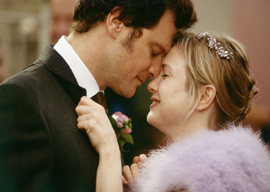
March 12, 2018

Colin Firth and Renee Zellweger in Bridget Jones
Word reached me that Friends—the anodyne ’90s “sitcom”—has riled the snowflakes. Its transgression is that it meets Stendhal’s definition of fiction: to be a mirror walking down the main street. On Friends, people act normally. The characters room with those of their own background; straight men like to be known as such; women are indecisive and want to be thin. “Trans” culture is seen as a niche phenomenon. None of this conforms to culture’s newly mandated role as signpost not mirror.
Agitprop used to be a subset of culture; now it is culture. Examples stick to one like burrs in a briar. The U.K.’s latest Dr. Who series launched with a plotline about an intersectional lesbian. The one straight white character committed the irredeemable faux pas of fancying her (acting like the perfect, #MeToo compliant gentleman did little to alleviate the intended contempt). Compared with the androgynous “normal” student, he was also tall and well built—a piece of casting intended to convey the psychological violence of patriarchy.
Elsewhere in the topsy-turvy world of cultural Marxism, we find more explicitly political inversions. The U.N. as represented in Independence Day 2 pits the wise and pacifistic—yet authoritarian—regimes of the East against the hotheaded democracy of the U.S. Step away from that ballot paper! Help is at hand, however. Like old clunkers, the problematic cultural outputs of the past are still with us, fugging the cultural highway with reminders of more perennial truths.
To illustrate the exponential rate of change, let us start as recently as the dawn of our happy new millennium—with the misogynistic masterpiece Bridget Jones’s Diary. This tells of a woman who needs a man a lot more than a fish needs a bicycle. She is concerned with child-rearing, and otherwise fears being eaten by Alsatians. She wears short skirts to work in an effort to attract her boss. It transpires she can’t tell the difference between a bastard and a gentleman. While the bastard is a liar and hypocrite—#MeToo, anyone?—the gentleman is honest. When she puts it to him that he finds her ridiculous, he honors her with the straight answer: “There are elements of the ridiculous about you.” And yet at the heart of their attraction is the same truthfulness. Rather than wanting a ball-breaking feminist agitatrix, it turns out he likes her “just the way you are.” The traditionalist theme is mirrored when—having made a fool of herself with a minor TV celebrity—Bridget’s mother returns to the family home. The reason she gives her husband is a quiet paean to humanity: “You’re just such a normal color.”
If BJD portrays women as kind and dependent, Kind Hearts and Coronets commits the symmetrical crime of portraying them as unkind and dependent. Here aptly named antiheroine Sibella ignores the advances of her cousin until he murders his way to a great fortune—at which point she rapidly runs up the flag of affection for him. Yet as recently as 2001, The Guardian listed Kind Hearts in its My Favourite Movie slot. Thank goodness reeducation has reached the point that such an organ of Progress would never now commit such an infraction.
Comedy has always been a main target of political correctness because it is by definition rooted in culture—and culture is a main roadblock to the social Armageddon required for a New Society. For all its value in advancing this goal, the counterculture of the ’60s was thoroughly encrusted with the barnacles of prejudice. Although it fulfilled the progressive goal of celebrating criminal transgression, the rest of cult comedy The Italian Job is a thicket of red flags. Michael Caine’s dippy girlfriend almost gives them away with an effusive feminine airport farewell. Computer boffin Professor Peach has a predilection for fat birds—as revealed by his past assault on sizable housekeeper Annette—which our lovable rogues use to lure him away from his medical confinement. The only black character in the entire movie undoes the gang’s good work by nearly driving them and their loot off a cliff. Needless to say, Italians are portrayed throughout as either criminals or idiots (“Non ci credo!” wails the hand-wringing head of the Turin traffic department when confronted with the work of the Anglo-Saxon privateers).